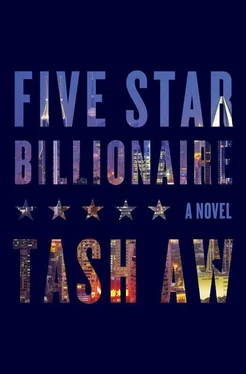“Bureaucracy? You mean corruption! But well done, man.”
“ Ya , man, we’re proud of you,” the Malay girl’s boyfriend said. Justin recognized him; Tony Ramakrishnan was a contemporary of C.S.’s at St. John’s. When Tony was small, he used to wet the bed every time he stayed over, even when he was ten or eleven — anxiety, Justin’s mother had said; now he was six feet one, Oxford-educated, and recently qualified as a criminal lawyer. “People like us, we have to take a stand. Funny, I always thought of you as a real establishment figure, but actually you’re a pretty cool guy — you’re one of us.”
Yinghui laughed. “You know these Lim boys — full of hidden depths.” She looked at Justin as she climbed back into the hammock, her legs scrabbling awkwardly as she hauled herself up.
Time — how it expands to fill the spaces you create; how it makes meager experiences seem never-ending. Whenever he heard people talk about the ravages of time, about how it robbed and deprived, Justin always smiled, because for him, time was always an accomplice, plugging the gaps and fleshing out morsels of memory so that he would have something substantial to hang on to later. That way, however little he had seen or felt, he would always feel as if he had more: a life far richer than the truth.
Later that afternoon, they went swimming. The sea was warm and gray, and there was flotsam in the water — small pieces of driftwood, rafts of casuarina needles, plastic bottles. There must have been a storm out at sea, someone said: Everything was churned up. The boys had had a few beers; Yinghui was the only girl who’d joined them in drinking, but the alcohol had made her silent, not raucous. She swam on her own, breast-stroking placidly with her head above the low waves. They swam for an hour, perhaps, until dusk began to settle, an unshifting cloud dampening the colors of sunset. But, in Justin’s mind, that relatively brief time spent floating in a warm sea swelled and expanded over the years and now seemed like hours and hours, stretching into eternity. Any remark she made — a compliment on his powerful swimming stroke, his unexpected grace in the water, the fact that his skin seemed to tan easily or that the turtles on his shorts were kind of cute, offhand comments, blithely delivered over the foamy wash of the waves — seemed rich with meaning, even though she meant nothing, he knew that. She might have said the same thing to everyone present, but time made those compliments belong entirely to him.
They stayed up late that night, chatting about how they were going to save their country. They had a vision of how the future should be. But how their vision would shift: They could not know that, in planning so assiduously, they’d failed to take into account that they would change. Tony Ramakrishnan would eventually abandon the criminal bar to set up a telecommunications company with a former client of his, supplying satellite-TV and mobile-phone services to 80 percent of the country; his pretty Malay girlfriend would soon be discovered by a new TV channel and become a celebrity, famous for being famous. C.S. would end up running the family firm when it was on its last legs, trying in vain to save it from total collapse, spending his days looking over accounts and spreadsheets he could not understand, married to a wife who had fallen in love with him because of the lifestyle he once represented but now didn’t, their marriage permanently alternating between states of boredom and semi-separation; they would stay together only for the sake of their two young children and because they lacked the youth and courage to start afresh with anyone else. Yinghui would go to Shanghai, where she would, against all odds and contrary to everyone’s expectations, become a businesswoman — a job description she once described as worse than a death sentence. And Justin — he would meet a sad fate; “gone a bit loco,” people would say. Or, as the more polite put it, “he opted out of the system.”
At around 1:00 A.M. they began to tire. They had promised to stay up to witness the dawn, but the beer had taken its toll and, slumped in their deep rattan armchairs, they began to doze. Yinghui was snoring gently with her mouth open, her head thrown back, face to the night sky. C.S. was fidgeting as he tried to find a comfortable position, pulling his knees up to rest his feet on the chair. Justin tried to fight the weight of slumber, but eventually he, too, fell asleep, and when he opened his eyes no one was there. The chairs were empty, the kerosene lamps that had lit their little circle gone; the lawn was dark, bounded by the silhouettes of the coconut trees that ran parallel to the beach.
The house, too, was dark — Justin had no clue as to who was sleeping in which room. He stood up and began to walk down to the beach. He was tired but did not want to go back into the house and stumble around trying to locate his room, waking everyone up in the process. He walked along the beach, tracing the line where the waves washed onto the shore. Even in the dark, this stretch of the coast was familiar to him, as if illuminated in permanent daylight. He had known it ever since he was a small child — with his eyes shut, he knew where the fine sand became studded with seashells before turning briefly to gravel; he knew where the lines of fishing boats were tethered to a row of coconut trees; he knew where the rocky barriers jutted out into the water, knew the best places to clamber over them. He walked for a long time, until he was far from the house and could see it from the other end of the bay. Framed by low hills, it looked the same as it always had. He had spent the whole evening talking about change, and yet it was familiarity that moved him, he thought.
He decided he would walk home along the road. He would have to cut through a small coconut plantation to reach it — a place he had been forbidden to enter when he was a child, because it had for a while become known as a gathering place for drug users. It was overgrown with low shrubs, but its paths were still clear enough, even at night, and he had no trouble easing his way through the vegetation. He was just approaching the run-down attap hut in the middle of the grove when he saw two people standing in its shadows. One of them remained close to the shack, the other kept pulling away before drifting slowly back to the first person, their T-shirts gleaming a ghostly white in the gloom. Justin crouched down behind some bushes. Even from a distance he could tell that the person leaning against the hut was his brother — the movement of his arms, the way he inclined his head to kiss the other person: C.S.’s traits were unmistakable. Gradually the other person ceased to move away from C.S. but remained close to him, their forms becoming indistinct. Justin looked at the ground, at the black earth under his feet. He was trapped — any movement would alert the amorous couple. Eventually the other person walked away swiftly, down another path that led to the beach. As she passed not ten paces away from Justin, he saw that she was the pretty Malay girl, Tony Ramakrishnan’s girlfriend, picking her way doelike through the shrubs. Ten long minutes later, C.S. made his way in the opposite direction, toward the road, where Justin had been heading.
Justin waited, crouched in the dark. Long after C.S. had gone, he was still there, motionless, as if he had done something wrong — which was ridiculous, he thought. Yet he was incapable of moving. Eventually he turned back and made his way to the beach, walking as slowly as he could. By the time he arrived at the house, the inky sky was beginning to lighten, the first hints of dawn appearing.
He sat on the sand in front of the lawn. The waves seemed stronger now, as if enthused by the prospect of dawn; a westerly wind blew across them, rippling their crests. He heard footsteps approaching, the creaking of the low gate that led from the lawn to the beach. He turned around and saw Yinghui walking toward him.
Читать дальше
Конец ознакомительного отрывка
Купить книгу


![Scott O’Hara - Five-Star Fugitive [= Border Town Girl]](/books/432138/scott-o-hara-five-thumb.webp)









